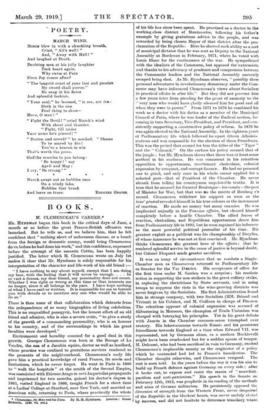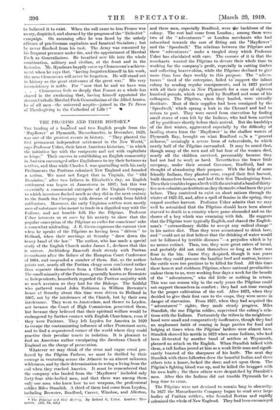BOOKS.
M. CLEMENCEATJ'S CAREER..
Ma. Hummer began this book in the critical days of June, a month or no before the great Franco-British offensive was launched. But he tells us, and wo believe him, that he felt confident that " nothing short of unforeseen disease. or a bomb from the foreign or domestic enemy, would bring Clemenceau do ma before he had done his work," and this confidence, expressed before the attempt of the assassin Cottin, has been happily justified. The letter which M. Clemenceau wrote on July 1st makes it clear that Mr. Hyndman is solely responsible for his interpretation of the character and life-work of his old friend:— "I have nothing to say about myself, except that I am doing my best, with the feeling that it will never be enough.. . . In so vast a drama, my dear friend, my personality does not count. Whether I was right or wrong at this time or that interests me no longer, since it all belongs to the pest. 1 have kept nothing of what I have said or written. It is impossible for me to furnish you with details or to mention any one who would be able to do so."
There is thus none of that collaboration which detracts from the independence of so many biographies of living celebrities. This is no unqualified panegyric, but the honest effort of an old friend and admirer, who is also a severe critic, " to give a study of the growth of a commanding personality, who is an honour to his country, and of the surroundings in which his great faculties were developed."
Environment and heredity counted for a good deal in this growth. Georges Clemenceau was born in the Bocage of La Vendee, the son of a Jacobin squire, doctor as well as landlord, whose practice was confined to gratuitous services rendered to the peasants of the neighbourhood. Clemenceau's early life gave him a practical knowledge of rural France, its needs and limitations, which he never forgot. He went to Paris in 1860 to "walk the hospitals" at the zenith of the Second Empire, was rissociated with Etienne Arago in anti-Imperialiat propaganda and imprisoned for two months, gained his doctor's degree in 1865, visited England in 1868, taught French for a short time at a Ladies' College at Stanford, near New York, and married an American wife, returning to Paris, where practically the whole
• (1St
Rich ards. ute eh set. aand his Tone. By 8.14 ad. of his life has since been spent. He practised as a doctor in the working-class district of Montmartre, following his father's example by giving gratuitous advice to the people, and was rewarded by being chosen Mayor of that district after the pro- clamation of the Republic. Here lie showed ouch ability as a sort of municipal dictator that he was sent as Deputy to the National Assembly at Bordeaux in February, 1871, where he voted with Louie Blanc for the continuance of the war. He sympathized with the idealists of the Commune, but opposed the'extremiets, and thanks to his advocacy of prudence and compromise between the Communist leaders and the National Assembly narrowly escaped being shot. As Mr. Hyndman observes, "possibly these personal adventures in revolutionary democracy under the Com. mane may have influenced Clemeneeau's views about Socialism in practical afters in after life." But they did not prevent him a few years later from pleading for the grant of amnesty to the " very men who would have gladly silenced him for good and all when they were in power." From 1871 to 1876 he combined his work as a doctor with his duties as a member of the Municipal Council of Paris, where he was leader of the Radical section, be- coming in turn Secretary, Vice-President, and President, and con- sistently supporting a constructive policy of reform. hi 1876 he was again elected to the National Assembly. In the eighteen years of Parliamentary life which followed he upset fifteen Adminis- trations and was responsible for the election of three Presidents. This was the period that earned for him the titles of the " Tiger " and the " Calmuck." On the surface his policy seemed that of the jungle : but Mr. Hyndman shows that there wue at least some method in his madness. He was consistent in hie relentless opposition to opportunism, reactionary clericalism, colonial expansion by conquest, and corrupt finance. He had no personal axe to grind, and only once in his whole career applied for a salaried post—that of Presideut of the Chamber. He never shrank from telling his countrymen unpalatable truths. It is true that he secured for General Boulanger—his cousin—the post of Minister for War, but that was on the merits of Boulang record. Clemenceau withdrew his support as soon as the bray' general revealed himself in his true colours as the instrument of reaction. He made no money but many enemies. He was implicated unjustly in the Panama affaire, but cleared himself completely before a hostile Chamber. The allied forces of reaction, clericalism, and Republican opportunism drove him from Parliamentary life in 1893, but he soon regained his influence as the most powerful political journalist of his time. His greatest exploit as a publicist was his championship of Dreyfus, of whose innocence he was not at first convinced. Mr. Hyndman thinks Clemenceau the greatest hero of the affairs; that lie rendered splendid service to the cause of justice is beyond doubt, but Colonel Picquart made greater sacrifices.
It was an irony of circumstance that no resolute a Single. Chamber man as Clemeneeau returned to Parliamentary life as Senator for the Var D:strict. His acceptance of office for the first time under M. Sarrien was a surprise ; his resolute action in supporting the non-strikers in the groat colliery strike, in replacing the electricians by State servants, and in using troops to suppress the riots in the wine-growing districts was never forgiven by the Socialists. His first Administration found
him in strange company, with two Socialists Briand and Viviani) in his Cabinet, and H. Caillaux in charge of Finance. The relentless opposer of colonial expansion was accused of filibustering in Morocco, the champion of Trade Unionism woe charged with betraying his principles. Yet in his great debate with Jaunts in the Chamber common-sense triumphed over oratory. His lukewarmness towards Russia and his persistent' friendliness towards England at a time when Edward VII. wee represented, not by Germans alone, as a modern Machiavelli might have been overlooked but for a sudden spasm of temper. M. Deleaare, who had been sacrificed in vain to Germany, excited Clemencesu's implacable enmity as the originator of a policy which he contended had led to France's humiliation. The Chamber thought otherwise, and Clemenceau resigned. The rest is soon told. In the years before the war it was his aim to build up French defence against Germany on every side ; after it broke out, to expose and resist the mania of " anarchist- pacifism and anti-patriotism." His speech in the Senate on February 12th, 1912, was prophetic in its reading of the methods and aims of German militarism. He persistently opposed the diversion of strength from the Western Front, never despaired of the Republic in the blackest hours, was never unduly eleed by success, and did not hesitate to denounce treachery whose
he believed it to exist. When the call came to him France was weary, dispirited, and alarmed by the progress of the "Defeatist" campaign. On assuming office he was faced by the unholy alliance of pro-German capitalists and fanatical Socialists ; but he never flinched from his task. The Army was reassured by his frequent presence under fare, and the appointment of Marshal Yoeh as Generalissimo. He breathed new life into the whole combination, military and civilian, at the front and in the factories. ate. Hyndman happily sures up Clomenceau'a achieve- ment when he says that, "having forgotten himself in his work, the man Clemeneeau will never be forgotten. He will stand out in history as the great statesman of the great war." His very inconsistency is noble. For "now that he and we have won . . . Clemenceau feels so deeply that France as a whole has shared in the awakening that, having himself appointed the devout Catholic Marshal Foch Generalissimo of the Allied Armies, Ire of all men—the universal sceptic—joined in the Te Dem of Thanksgiving in the Cathedral of Lille !" •



































 Previous page
Previous page